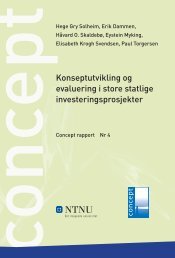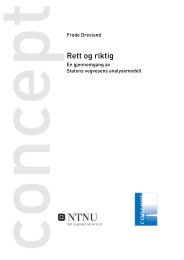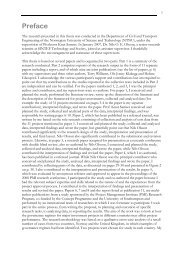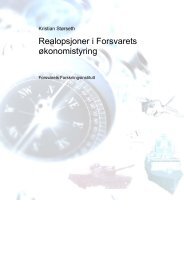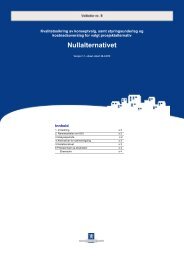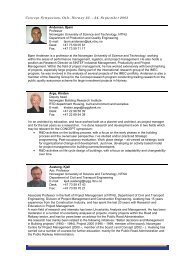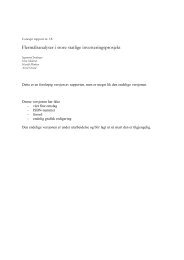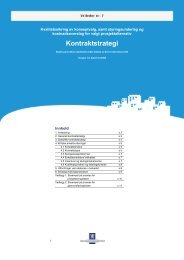How Optimism Bias and Strategic ... - Concept - NTNU
How Optimism Bias and Strategic ... - Concept - NTNU
How Optimism Bias and Strategic ... - Concept - NTNU
You also want an ePaper? Increase the reach of your titles
YUMPU automatically turns print PDFs into web optimized ePapers that Google loves.
psychological, <strong>and</strong> political-economic--account for the data on cost overruns <strong>and</strong><br />
benefit shortfalls presented earlier? This is the question to be answered in this section.<br />
Technical explanations have, as mentioned, gained widespread credence among<br />
forecasters <strong>and</strong> planners (Ascher, 1978; Flyvbjerg, Holm, <strong>and</strong> Buhl, 2002, 2005). It turns<br />
out, however, that such credence could mainly be upheld because until now samples<br />
have been too small to allow tests by statistical methods. The data presented above,<br />
which come from the first large-sample study in the field, lead us to reject technical<br />
explanations of forecasting inaccuracy. Such explanations do not fit the data well.<br />
First, if misleading forecasts were truly caused by technical inadequacies, simple<br />
mistakes, <strong>and</strong> inherent problems with predicting the future, we would expect a less<br />
biased distribution of errors in forecasts around zero. In fact, it was found with high<br />
statistical significance that for four out of five distributions of forecasting errors, the<br />
distributions have a mean statistically different from zero. Only the data for inaccuracy<br />
in road traffic forecasts have a statistical distribution that seem to fit with explanations<br />
in terms of technical forecasting error.<br />
Second, if imperfect techniques, inadequate data, <strong>and</strong> lack of experience were main<br />
explanations of inaccuracies, we would expect an improvement in accuracy over time,<br />
since in a professional setting errors <strong>and</strong> their sources would be recognized <strong>and</strong><br />
addressed through the refinement of data collection, forecasting methods, etc.<br />
Substantial resources have in fact been spent over several decades on improving data<br />
<strong>and</strong> methods. Still our data show that this has had no effect on the accuracy of forecasts.<br />
Technical factors, therefore, do not appear to explain the data.<br />
It is not so-called forecasting “errors” or their causes that need explaining. It is the fact<br />
that in a large majority of cases, costs are underestimated <strong>and</strong> benefits<br />
overestimated. One may agree with proponents of technical explanations that it is, for<br />
example, impossible to predict for the individual project exactly which geological,<br />
environmental, or safety problems will appear <strong>and</strong> make costs soar. But one must also<br />
maintain that it is possible to predict the risk, based on experience from other projects,<br />
that some such problems will haunt a project <strong>and</strong> how this will affect costs. Such risk<br />
can <strong>and</strong> should be accounted for in forecasts of costs, but typically is not. For technical<br />
explanations to be valid, they would have to explain why forecasts are so consistent<br />
in ignoring cost <strong>and</strong> benefit risks over time, location, <strong>and</strong> project type.<br />
Psychological explanations better fit the data. The existence of optimism bias in<br />
planners <strong>and</strong> promoters would result in actual costs being higher <strong>and</strong> actual benefits<br />
being lower than those forecasted. Consequently, the existence of optimism bias would<br />
be able to account, in whole or in part, for the peculiar bias found in most of our data.<br />
Interestingly, however, when you ask forecasters about causes for forecasting<br />
inaccuracies in actual forecasts, they do not mention optimism bias as a main cause of<br />
inaccuracy (Flyvbjerg, Holm, <strong>and</strong> Buhl, 2005: 138-140). This could of course be because<br />
optimism bias is unconscious <strong>and</strong> thus not reflected by forecasters. After all, there is a<br />
large body of experimental evidence for the existence of optimism bias (Buehler et al.,<br />
1994; Buehler, Griffin, <strong>and</strong> MacDonald, 1997; Newby-Clark et al. 2000). <strong>How</strong>ever, the<br />
experimental data are mainly from simple, non-professional settings. This is a problem<br />
<strong>Concept</strong> rapport nr. 17<br />
49



